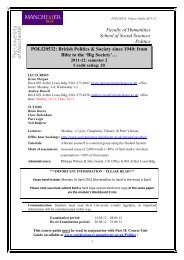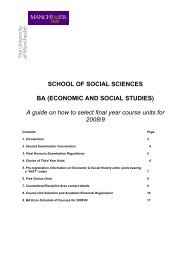CHNN 22, Spring 2008 - School of Social Sciences
CHNN 22, Spring 2008 - School of Social Sciences
CHNN 22, Spring 2008 - School of Social Sciences
You also want an ePaper? Increase the reach of your titles
YUMPU automatically turns print PDFs into web optimized ePapers that Google loves.
Thesis reports<br />
The Communist Party <strong>of</strong> Great Britain and Anti-Racist<br />
Politics, 1948-1981<br />
This PhD thesis was successfully completed in December 2007 for the Department <strong>of</strong><br />
History at Flinders University, South Australia. A copy has been sent to the Labour<br />
History Archive and Study Centre in Manchester.<br />
T<br />
his thesis examines how the Communist Party <strong>of</strong> Great Britain, as the largest political<br />
organisation to the left <strong>of</strong> the Labour Party and an influential force within the trade unions,<br />
reacted to the arrival <strong>of</strong> immigrants from the Commonwealth in the post-war period, how<br />
anti-racism was incorporated into the party’s wider struggle for socialism and the practical role<br />
that the party occupied within the anti-racist movement in Britain. The scope <strong>of</strong> the thesis begins<br />
with the onset <strong>of</strong> large-scale black immigration, symbolized by the arrival <strong>of</strong> the SS Empire<br />
Windrush with 492 West Indians aboard at Tilbury in June 1948, through what Robert Miles and<br />
Annie Phizacklea described as ‘the racialisation <strong>of</strong> British politics’, 1 ending with the riots across<br />
Britain in the summer <strong>of</strong> 1981, when black and white youth reacted violently towards the<br />
institutions <strong>of</strong> the state under Thatcherism. This time frame corresponds with the shifts in the<br />
Communist Party’s post-war strategy towards parliamentary democracy under The British Road to<br />
<strong>Social</strong>ism and through their ‘Indian Summer’ 2 during the industrial militancy <strong>of</strong> the late 1960s and<br />
early 1970s, before the party suffered internal schisms and declining membership in the early<br />
1980s. The history <strong>of</strong> anti-racism and the Communist Party was the history <strong>of</strong> a potential<br />
squandered, one that had greatly diminished between the 1950s, when many black immigrants<br />
were attracted to the party due to its anti-colonial legacy, and the early 1980s, when the party was<br />
in sharp decline and the black communities were wary <strong>of</strong> labour movement that had for so long<br />
minimised the problems <strong>of</strong> racism that black Britons faced. At the heart <strong>of</strong> the division between the<br />
CPGB and black workers was the belief that racism was borne out <strong>of</strong> capitalism and that measures<br />
taken to combat racism needed to be encompassed into the wider activities <strong>of</strong> the class struggle.<br />
Despite the CPGB declaring that the interests <strong>of</strong> white and black workers were essentially the same,<br />
the party faced major problems in convincing white workers, including the party’s own members,<br />
to be actively involved in the fight against racism, particularly against racial discrimination in the<br />
workplace and amongst the labour movement.<br />
There are several factors that need to be examined in a history <strong>of</strong> the CPGB and anti-racist politics,<br />
which are focused upon in this thesis. It must be remembered that the CPGB was primarily made<br />
up <strong>of</strong> skilled and semi-skilled workers and, more so than other European communist parties, was<br />
significantly representative <strong>of</strong> the nation’s working class. This is important as racism was pervasive<br />
in British society in the post-war period and racist beliefs were abundant in the working class. The<br />
Communist Party, by recruiting workers, could not be immune to some forms <strong>of</strong> racial prejudice<br />
amongst its members, but it is important to analyse how anti-racist sentiment was formed within<br />
the party and what practical effects this had upon anti-racist activities by party members.<br />
Although the party did have an important legacy <strong>of</strong> being involved in anti-colonial and anti-fascist<br />
struggles, many <strong>of</strong> its (primarily white) members had not been involved in this sphere <strong>of</strong> party<br />
activity and during the economic boom <strong>of</strong> the post-war period, were more concerned with the<br />
‘bread and butter’ issues <strong>of</strong> wage militancy and protecting workers’ rights. 3 Although these trade<br />
union issues were extremely important, the problems faced by black workers were <strong>of</strong>ten overlooked<br />
and issues <strong>of</strong> racism were subordinated to the class struggle. The perception <strong>of</strong> racism as a<br />
construct <strong>of</strong> the capitalists to divide the working class and its eradication tied to the ideal <strong>of</strong><br />
socialist revolution meant that combating racism was consistently neglected, not just by the CPGB,<br />
but by most sections <strong>of</strong> the labour movement and the left. The CPGB was willing to make use <strong>of</strong> its<br />
black members, but the focus <strong>of</strong> the party remained upon the issues <strong>of</strong> industrial class politics.<br />
Just as important as the party’s attitude towards ‘race’ and its place within the class struggle was<br />
the practical implications <strong>of</strong> the party’s post-war strategy upon anti-racist activism. Outlined in the<br />
9
















